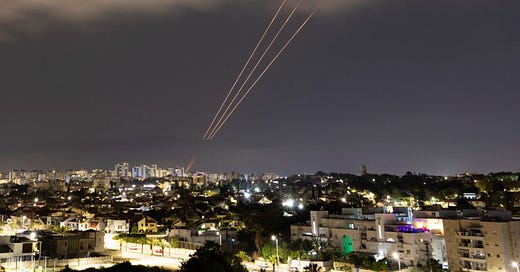Israel should learn two important lessons from the massive missile attacks launched by Iran last night. First, its defenses against missile and drone attack are incredibly effective, serving as an effective deterrent against even the most lethal foe. And, second, Israel needs friends. The question for Prime Minister Benjamin Netanyahu and his government is whether they will learn these lessons.
The Iranian missile assault on Israel early Sunday morning was outrageous, and also unprecedented. It was massive in scale—Iran launched hundreds of drones, cruise missiles, and ballistic rockets at Israel. The barrage was the first time any nation had attacked Israel since Iraq fired Scud missiles during the Gulf War in 1990. The sound of sirens and booms throughout the night will have taken many back to those dark and scary days of missiles attacking cities more than 30 years ago. Who could be certain Israel’s defenses would hold? Would the missiles carry chemical or biological warheads? Or even nuclear?
But the defenses held. Of the 330 missiles and drones Iran launched against Israel, nearly all were intercepted, with only a few ballistic missiles getting through, causing minor damage to one of Israel’s bases. Twelve wounded, and no deaths. Israel’s multi-layered defenses, consisting of the Iron Dome and Arrow 3 systems, worked almost flawlessly. That reality should give any of Israel’s enemy pause, for Iran’s massive missile attack was defeated without the need for an offensive response.
And then there were Israel’s friends. US forces in the region shot down dozens of missiles. Britain said its fighters had intercepted missiles. And Jordan (yes, Jordan!) announced its Air Force had shut down missiles and aircraft flying over its territory. In other words, the defensive success was a collective one—with Israel’s defensive system (largely financed by US taxpayers) proving the most effective and decisive.
A Dangerous Moment
Nevertheless, this is an extremely dangerous moment—for Israel and the region. There is a real possibility of regional escalation. Hizbollah has a huge missile arsenal it can unleash against Israel at any moment. Iranian-backed militias in Syria and Iraq can attack US and other forces in these countries as well as Israel directly. The West Bank can explode, sparked by the kind of violence seen over the weekend in response to the death of an Israeli teenager. And Iran can unleash much more of its military might than it did last night.
Given the danger of further escalation, what Israel now needs most is friends: countries that will stand by its side. Last night, its friends showed up. But Israel can’t take for granted that they will do so the next time.
For Israel needs to recognize that it has tried the patience of its friends. The war in Gaza has created deep fissures between Israel and even its closest friends. The large number of civilian casualties, the unwillingness to allow enough humanitarian aid into the area, the refusal to take responsibility for basic security and services inside Gaza and to plan for the day after in any serious way has left Israel’s friends exhausted. The last thing they now want is further war and escalation.
President Biden, Israel’s best friend, especially since October 7, has made clear that if Israel decides to respond to the Iranian attack, it will be on its own.
Israel’s friends want de-escalation—an end to war and a return to diplomacy. It’s not clear that Israel’s current government shares that view.
Israel’s Choice
Netanyahu seeks “total victory” in Gaza (whatever that means). He is determined to go into Rafah, the final refuge for over a million Palestinians who have fled the other parts of Gaza leveled by the war. He has refused to consider who will govern Gaza after “victory”—making clear it won’t be Israel and can’t be any Palestinians. And he has said the war cannot end until the threat in the North has been removed.
Biden has offered an alternative for Israel to consider. A ceasefire and the return of all hostages. A revitalization of the Palestinian Authority to govern both the West Bank and Gaza. An international peacekeeping force to assist the PA in that effort. A diplomatic path to return southern Lebanon to the control of Lebanese forces under UN supervision. And a normalization of relations with Saudi Arabia (in return for which the United States is prepared to sign legally binding security guarantees and assist Saudi Arabia in building a complete civilian nuclear program).
The key to all of this, though, is Israel providing a clear “pathway” towards a two-state solution—with a definitive timetable and ways to measure progress. Netanyahu has refused to even discuss such a pathway—for him “total victory” seems to consist of permanent occupation of Palestinian lands.
If that’s the path Israel wants to walk, then it will most likely have to walk it alone. And it won’t be able to count on its friends being there when, as last night, they are needed most.






The question is whether Biden will learn the right lessons. Israel understands survival far better than Washington does.